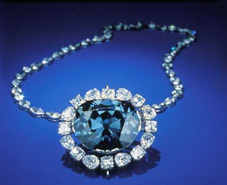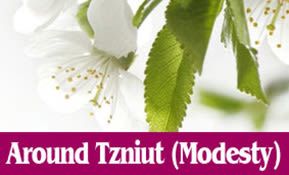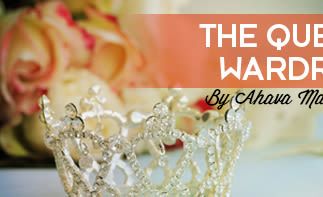Note: This article addresses tzniut (modesty and the Jewish laws instituted for its maintenance), but it is very important for me as the author to express that it is not tzniut from the perspective of someone who always believed in it, who always followed it, or who even respected it in the least. This is from the perspective of someone who was in fact anti-tzniut, and who thought tzniut was ugly or embarrassing or just a way to cover up what wasn’t pretty. Baruch Hashem (thank G-d), I realized how precious tzniut really is, and I hope that through this article you may realize too, not only how precious tzniut is but how it allows you to actualize, cultivate, and preserve your preciousness as a Jewish woman.
The dictionary defines precious as something of high price or great value; something highly esteemed for spiritual, non-material, or moral quality; or something  dear, beloved, and excessively delicate. When we think of the word precious, we may picture diamonds and fancy jewels, photos of a baby’s first smile or a child’s first step, an incredible friend, or a once-in-a-lifetime, indescribable experience. However, nothing that we deem precious is displayed freely on the street, conveniently up for grabs, available at any and all times; rather, it is something difficult to come by, something rarely found or seen, a unique and priceless moment that no one wants to miss.
dear, beloved, and excessively delicate. When we think of the word precious, we may picture diamonds and fancy jewels, photos of a baby’s first smile or a child’s first step, an incredible friend, or a once-in-a-lifetime, indescribable experience. However, nothing that we deem precious is displayed freely on the street, conveniently up for grabs, available at any and all times; rather, it is something difficult to come by, something rarely found or seen, a unique and priceless moment that no one wants to miss.
All Jewish women are considered precious. Both the inner beauty of a Jewish woman’s neshama (soul) and her outer beauty or her physical appearance, which reflects her neshama, are invaluable. Being that we carry such worth, we as Jewish women have the responsibility of cherishing and preserving it, as well as guarding it from harm. Just as a diamond isn’t found as the delicate, sparkling gem that one sees in an engagement ring or tennis bracelet, rather as a rock buried in dirt that must be cut, cleaned, and polished until it takes on its character elegance and luster, so too we as women must refine ourselves to harbor and augment our preciousness, setting ourselves apart, and like the owners of diamonds, treasure it, safeguard it, and nurture it so that its full potential is always emphasized. Furthermore, just as the owner of a gem invests much time and energy in protecting it from theft or damage, keeping it well covered and in a safe place, a Jewish woman must protect the purity of her precious neshama by reflecting refinement in her outer appearance, in dress and manner.
This is why Jewish laws of tzniut provide us with helpful rules and structure to assist us in cultivating and sustaining our preciousness, exalting and enhancing it rather than taking away from it and making it ordinary and unexciting. Tzniut teaches us how to maintain our beauty and elegance without putting it on display, but rather by cherishing it and keeping it sacred. And, while initially, I was among the many who believed that if we have beauty, then even more so we should show it, I now realize that that which is too eagerly displayed is not appreciated or valued, just as a ring from the dollar store is no where near as valued as a nearly impossible to procure Tiffany’s special edition diamond ring. Tzniut allows a woman to set boundaries for herself so as to protect and honor her beauty rather than display it and take away from its rarity. Tzniut allows Jewish women to set themselves apart from the everyday immodesty and looseness of the streets and elevate themselves to a level of dignity and prestige as is only worthy of someone or something precious.
The same way that an opulent diamond is clothed in a nearly equally rare and polished setting, we must clothe ourselves and our elegance with class. Jewish women are the daughters of The King. A daughter of a king would not be found in the streets wearing skimpy clothing, nor would she be found wearing anything less than the highest class and style. So too, we as Jewish women, as the daughters of The King, are given guidance by the laws of tzniut as to how to represent ourselves as the princesses we are, preserving and sustaining both our and Hashem’s honor, as well as celebrating our status as precious daughters of The King. Rather than reflecting in our dress our earthly and superficial desires, we reflect inner splendor and royalty.
Once the value of tzniut is realized, however, it is not easy to simply make the transition from non-believer to tzniut-observer. I won’t lie. Firstly, modern style lends itself to a very different motto, one to which I also once ascribed, “the more eye-catching the better.” It is not always so simple to find appropriate, aesthetically pleasing clothing. But fortunately, because we are Jewish women, we also don’t give in very easily, and our resolve to find such suitable clothing only adds to our observance of the mitzvah. Additionally, Chazal (our wise sages) say that tzniut is an inherent and integral part of the Jewish woman, as she was created from an internal rib. Why internal? A Jewish women’s beauty is internal, not amongst the public (Midrash Tanchuma, Vayeishev, 6). Chazal also state that in the creation of the Jewish woman, Hashem instructed that every limb be modest (Bereishit Rabba 18:3). Therefore, while challenges present themselves, while the transition takes time, guidance, learning of the laws of tzniut, and investment (both financial, in buying new clothing, and personal, in developing and furthering the belief behind it), Jewish women all have it in them, from the time of Creation, to succeed in protecting and exalting their precious neshamot (souls) through the laws of tzniut.
For a little added encouragement, it is stated that what the Torah does for man, tzniut does for a woman. Tzniut is a woman’s personal antidote to the yetzer harah (Evil Inclination). Additionally, some of the many benefits attributed to tzniut are contributing to the safety and kedusha (holiness) of klal Yisrael (the Jewish people), as well as making the foundation for a happy and holy household for her family. May we all merit, with the help of Hashem, to work on our tzniut and not only acknowledge and elevate our preciousness as Jewish women but also reap the benefits from its maintenance.
B’ezrat Hashem (With the help of G-d), in the next article, we will explore some of the basic halachot (laws) surrounding tzniut as an introduction to where the mitzvah comes from and how one can begin to practice it. Until then, I hope that at least for some, this article has provided a glimpse into just how precious Jewish women are, and how important it is to safeguard and nurture that preciousness.
(Several helpful notes for this article were taken from Rabbi Pesach Eliyahu Falk’s book on tzniut, Oz V’hadar Levusha – Modesty: An Adornment for Life, Gateshead, England, 1998.)


 dear, beloved, and excessively delicate. When we think of the word precious, we may picture diamonds and fancy jewels, photos of a baby’s first smile or a child’s first step, an incredible friend, or a once-in-a-lifetime, indescribable experience. However, nothing that we deem precious is displayed freely on the street, conveniently up for grabs, available at any and all times; rather, it is something difficult to come by, something rarely found or seen, a unique and priceless moment that no one wants to miss.
dear, beloved, and excessively delicate. When we think of the word precious, we may picture diamonds and fancy jewels, photos of a baby’s first smile or a child’s first step, an incredible friend, or a once-in-a-lifetime, indescribable experience. However, nothing that we deem precious is displayed freely on the street, conveniently up for grabs, available at any and all times; rather, it is something difficult to come by, something rarely found or seen, a unique and priceless moment that no one wants to miss.







Tell us what you think!
Thank you for your comment!
It will be published after approval by the Editor.